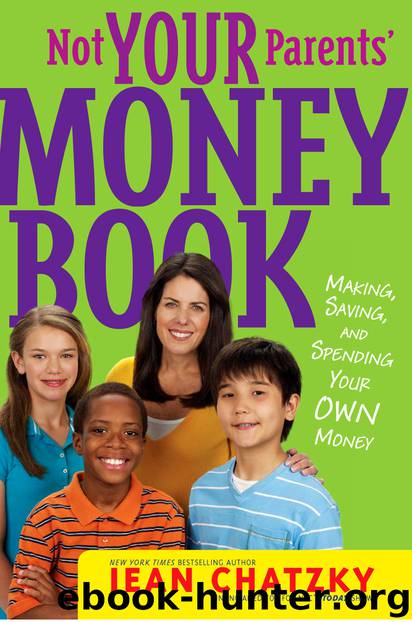Not Your Parents' Money Book by Jean Chatzky

Author:Jean Chatzky
Language: eng
Format: epub
Publisher: Simon & Schuster Children's Publishing
Published: 2010-09-08T16:00:00+00:00
CHAPTER SIX
WHERE
Should Your
MONEY LIVE?
Did you know you can’t take money out of your savings account? I asked my mom, “Can I take money out of it?” and she said, “No.” I said, “They won’t let you?” and she said, “I won’t let you because you’re going to spend it on candy.”
—Jesse, 11
WHEN YOU’RE A BEGINNING SAVER, you generally do store your money at home. That’s okay to start, but it’s not a long-term solution. Why? Well, it’s not safe. If someone steals your cash (I was amazed to hear how many of the kids I interviewed said that their brothers and sisters steal from them), your cash is gone. You may also lose it. Studies have shown that on average families have $90 in spare cash and change in various places around the house. But those aren’t the only reasons your money at home isn’t secure. One other big one: inflation. Inflation causes the prices of the things you buy to go up around 3 percent a year. If you aren’t earning at least that much of a return on your money, then you are actually losing purchasing power—which is the same thing as losing money.
Your first alternative is to put your money somewhere it can earn you interest just for sitting there, while not subjecting you to the risk of losing any of it. This is what saving in a bank or credit union is all about. Your second alternative is to put your money to work for you in a place where you could make substantially more money, but you could also lose money. This is called investing. We’ll deal with saving in this chapter and investing in the next one.
We save money, as you probably know, in banks and credit unions. Both types of institutions provide insurance on deposits of up to $250,000 per person (banks provide insurance through the FDIC, credit unions through National Credit Union Administration), which means that if the bank or credit union in which you have your money goes out of business, you’ll get your money back from the institution that insures it. The difference is that banks are businesses run to make a profit for the shareholders that own them, while credit unions are not-for-profit businesses owned by their members. Because credit unions are not for profit, they can give the money they earn back to their customers in the form of higher interest rates on savings, and they can charge them lower interest rates on loans. But they generally don’t have the conveniences of big banks, like a lot of branches to visit or as big a network of ATMs where you can withdraw cash. This can be a big (and expensive) deal. If you are going to use the ATM on a regular basis, you need to be sure you’re using one in your own bank’s or credit union’s network. Otherwise you’ll be charged around $3 per transaction just for getting your own money out. Use another bank’s machine
Download
This site does not store any files on its server. We only index and link to content provided by other sites. Please contact the content providers to delete copyright contents if any and email us, we'll remove relevant links or contents immediately.
On Writing A Memoir of the Craft by Stephen King(4936)
The Doodle Revolution by Sunni Brown(4753)
A Simplified Life by Emily Ley(4158)
Mummy Knew by Lisa James(3686)
Marijuana Grower's Handbook by Ed Rosenthal(3677)
Better Homes and Gardens New Cookbook by Better Homes & Gardens(3589)
Figure Drawing for Artists by Steve Huston(3446)
Paper Parties by Erin Hung(3420)
Draw Your Day by Samantha Dion Baker(3357)
The Genius of Japanese Carpentry by Azby Brown(3294)
The Code Book by Simon Singh(3181)
Japanese Design by Patricia J. Graham(3167)
Dangerous Girls by Haas Abigail(3039)
Lions and Lace by Meagan Mckinney(2972)
The Curated Closet by Anuschka Rees(2968)
How to Make Your Own Soap by Sally Hornsey(2895)
The Checklist Manifesto by Atul Gawande(2849)
The Wardrobe Wakeup by Lois Joy Johnson(2780)
Zero to Make by David Lang(2778)
